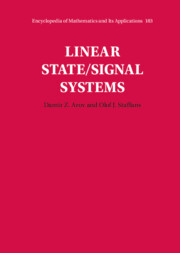Book contents
- Frontmatter
- Contents
- Preface
- Notations
- 1 Introduction and Overview
- 2 State/Signal Systems: Trajectories, Transformations, and Interconnections
- 3 State/Signal Systems: Dynamic and Frequency Domain Properties
- 4 Input/State/Output Representations
- 5 Input/State/Output Systems: Dynamic and Frequency Domain Properties
- 6 Bounded Input/State/Output Systems in Continuous and Discrete Time
- 7 Bounded Input/State/Output Systems in Continuous and Discrete Time
- 8 Semi-bounded Input/State/Output Systems
- 9 Semi-bounded State/Signal Systems
- 10 Resolvable Input/State/Output and State/Signal Nodes
- 11 Frequency Domain Input/State/Output Systems
- 12 Frequency Domain State/Signal Systems
- 13 Internally Well-Posed Systems
- 14 Well-Posed Input/State/Output Systems
- 15 Well-Posed State/Signal Systems
- Appendix A Operators and Analytic Vector Bundles in H-Spaces
- References
- Index
9 - Semi-bounded State/Signal Systems
Published online by Cambridge University Press: 05 May 2022
- Frontmatter
- Contents
- Preface
- Notations
- 1 Introduction and Overview
- 2 State/Signal Systems: Trajectories, Transformations, and Interconnections
- 3 State/Signal Systems: Dynamic and Frequency Domain Properties
- 4 Input/State/Output Representations
- 5 Input/State/Output Systems: Dynamic and Frequency Domain Properties
- 6 Bounded Input/State/Output Systems in Continuous and Discrete Time
- 7 Bounded Input/State/Output Systems in Continuous and Discrete Time
- 8 Semi-bounded Input/State/Output Systems
- 9 Semi-bounded State/Signal Systems
- 10 Resolvable Input/State/Output and State/Signal Nodes
- 11 Frequency Domain Input/State/Output Systems
- 12 Frequency Domain State/Signal Systems
- 13 Internally Well-Posed Systems
- 14 Well-Posed Input/State/Output Systems
- 15 Well-Posed State/Signal Systems
- Appendix A Operators and Analytic Vector Bundles in H-Spaces
- References
- Index
Summary
This chapter is a state/signal counterpart to Chapter 8. We recall that a s/s system is bounded if and only if it has at least one bounded i/s/o representation. In the semi-bounded setting, we turn this property into a definition and say that a s/s system is semi-bounded if it has at least one semi-bounded i/s/o representation. Most of the results presented in Chapter 7 for bounded s/s systems remain valid in one form or another for semi-bounded s/s systems, but there is one major exception: in the case of a bounded s/s system, the direction of time does not play an important role, i.e., most of the results that are true in the forward time direction are also true in the backward time direction. This is no longer true in the semi-bounded case. The even larger class of well-posed s/s systems is discussed in Chapter 15, and many of the results in the present chapter remain valid even in the well-posed setting.
- Type
- Chapter
- Information
- Linear State/Signal Systems , pp. 576 - 598Publisher: Cambridge University PressPrint publication year: 2022

